Posted by Elena del Valle on June 20, 2024

Thirst cover
Photos: Dutton, Anita Bugni
This year Dutton released Thirst (Dutton, $28), a 241-page hardcover fiction title, in English and Spanish in the United States. Written by Argentina born Marina Yuszczuk the vampire horror novel is set in early colonial Buenos Aires, Argentina. Heather Cleary translated the book. The author replied to questions by email via her publishing company publicist. The translator replied to questions via email.
When asked, with so many vampire novels already in print what inspired her to write Thirst she replied: “Well, precisely: I was inspired by thirst, which is endless. I had the desire to write about a vampire when an image materialized in my mind. I sensed I could bring a new perspective because this was a very specific image, set in Cementerio de la Recoleta in the XIXth century Buenos Aires. There are practically no vampires in the Argentinian literary tradition, and even horror is not a widely cultivated genre in my country. On another, more personal level, the urge to dive into such an erotic, sensual topic was irresistible.”
When asked about her primary target audience (in general, in the United States, and for the English edition) she replied: “First of all, I suppose, readers like myself who became fascinated with gothic literature as teenagers, who spent long hours of loneliness reading in their bedrooms with the door locked and developed a secret life, much like the heroes and heroines of gothic stories. I also believe—and this has been the case in Argentina—that Thirst is a vampire novel that can appeal to readers who are not used to reading vampire novels, or even horror. And I have to say, as I am myself a cinephile, I think this will appeal to horror movie fans, because vampire movies are in the very heart of Thirst.”
Regarding her biggest challenge in relation to the translation she said, “The biggest challenge in relation to the translation was getting editors in the US to read it, I guess! But that was my agent’s work, and she was brilliant. Then, of course, one aspect of the translation in which translator Heather Cleary and I worked very carefully was the specific scenario of XIXth century Buenos Aires with its particular mixture of colonial, French, and Italian architecture—a rather small town soon to become a modern, cosmopolitan city.”

Marina Yuszczuk
When asked about her goal and how she measures success she said: “I don’t think writers have goals other than to be able to keep on writing, and it is that necessity that makes us care about success, if we ever do. For me, success is the possibility to secure the writing of my next novel.”
Regarding next projects the author said, “I have already written two more novels after Thirst. One of them, Para que sepan que vinimos, was published in Argentina in 2022, and it’s a ghost story centered on the relationship between a grown-up daughter and her deceased mother. I just finished another novel, a gothic story set in a science museum in the last decades of the XIXth century.”
When asked “How did you decide on the cover art?” and “Who designed it?” she replied “The design team at Dutton did the cover art for the US edition, and I think it’s perfect—just the right mix of red, pink, the sensuality of the female body and the luxurious funerary art of past centuries.”
Yuszczuk, born in 1978, is founding editor of Rosa Iceberg, a press focused on publishing writing by women. She is the author of multiple books of poetry, short-story collections, and novels. She has a Ph.D. in literature from Universidad Nacional de la Plata and is a film critic for an Argentina newspaper. Thirst is her first book to be published in the United States.

Heather Cleary
“The greatest challenge, which was also one of the things I loved most about translating Thirst, was creating two distinct voices—one is sensual, gothic, and grounded in the nineteenth-century, while the other is very contemporary and more cerebral, in the sense that the character is presented through her diary entries, where she explores her inner world in detail,” said Cleary when asked what the greatest challenge the translation posed. “Marina’s Spanish provided a crystal clear model for how this should work, but rendering these tones and atmospheres with the different set of linguistic tools that English provides required careful attention.”
When asked if translating Spanish from Argentina differs from Spanish from other countries she replied, “Yes, in the sense that Spanish is different from country to country (and within countries, for that matter). But no, in the sense that the process of translation, wherever the Spanish is from, involves first understanding those differences and working with that as a baseline. For this project, it helped that I lived in Buenos Aires for nearly two years—in the same neighborhoods frequented by the characters, actually—so it was easier to distinguish between expressions that are often used colloquially and phrases that diverge from typical speech and should be treated more poetically.”
When asked if there was something she liked or that stood out in particular she replied, “I love the complexity with which Marina portrays female desire, which includes sexual desire but also so many other forms: the desire for professional success, for solitude within the responsibilities of caregiving, for connection with family and friends, and so on. This, and the textures of the relationship between the modern narrator and her dying mother (and also her relationship with her young son), make this book truly exceptional.”
Cleary’s work has been recognized by the National Book Foundation and the Mellon Foundation. She teaches at Sarah Lawrence College. She is the author of The Translator’s Visibility: Scenes from Contemporary Latin American Fiction.
Comments:
Filed Under: Books
Posted by Elena del Valle on June 5, 2024
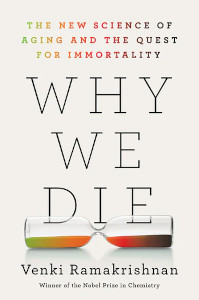
Why We Die
Photo: Harper Collins Publishers (William Morrow)
In Why We Die The New Science of Aging and the Quest for Immortality (William Morrow, $32.50) Venki Ramakrishnan, co-recipient of the 2009 Nobel Prize in Chemistry (for his work on the structure of the ribosome) and former president of the Royal Society, explores human mortality in a science and research oriented and thought provoking book.
In the book he asks what purpose we serve once we pass our reproductive years. Why do grandparents exist, he asks, for example. He explains that in the causes of aging known to date the processes are so interlinked and complex it’s difficult to separate causes and effects.
He wonders if living forever would be a good thing. He zeroes in on scientific research that has caught his attention from among many studies. And he presents the case that there would be social and ethical costs of attempting to live forever.
The 310-page book published in 2024 is divided into 12 chapters. Ramakrishnan leads the research team at the MRC Laboratory of Molecular Biology in Cambridge, England.
Comments:
Filed Under: Books
Posted by Elena del Valle on April 17, 2024
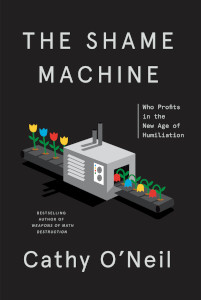
The Shame Machine
Photo: Penguin Random House
In The Shame Machine Who Profits in the New Age of Humiliation (Crown, $27), Cathy O’Neil, known for her previous book Weapons of Math Destruction, and Stephen Baker discuss their beliefs about shaming in society, especially via social media, and its effects on those targeted. The authors point to obesity, gender identity, possible body odor, addiction, poverty, political views, incels and hikikomori (a form of recluses in Japanese society) and age among the favorite subjects of those who shame people.
They say in that book that although shame may at times be used for social benefit, such as during the early years of covid to shame people into wearing masks and being vaccinated with an experimental vaccine, and to correct injustice; they believe it has increasingly become weaponized as a means to belittle the more vulnerable in society. They point to corporations, in particular Google and Facebook, and social media as the ultimate financial beneficiaries. In the case of hikikomori the financial motives may be less obvious although there are businesses dedicated to removing the recluses from the midst of their families, for a fee.
Most of us, the authors say in the chapter on humiliation and defiance, even if we are unaware, are likely to participate in shaming events. In the chapter on punching up they explain that punching up works when there is a choice and a voice. In that same chapter they explain that “shame is a toxin.”
They believe everyone should look at every aspect of life from the perspective of shame. They favor reparations for past wrongs. In lieu of shaming they propose an innovative approach to addiction: offering addicts a financial reward to visit methadone clinics; and giving money to the poor with no strings attached. A source of funding for these ideas was not evident.
The 255-page hardcover book published in 2022 is divided into 10 chapters in three main sections: Industrial Shame, Networked Shame and Healthy Shame. According the biography in the book O’Neil founded an algorithmic auditing company. In one case described in the book the work of her company (she was approached as an expert in “algorithms and crime risk scores) resulted in the release of a sexual predator convicted of raping an elderly woman. O’Neil wrote or co-wrote Doing Data Science and On Being a Data Skeptic.
Comments:
Filed Under: Books
Posted by Elena del Valle on February 7, 2024
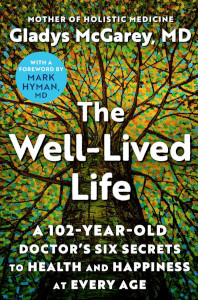
The Well-Lived Life
Photo: Simon and Schuster
India born Gladys McGarey, M.D., now 103, grew up to become a medical doctor in the United States. According to a recent article in The Wall Street Journal and her biography although she retired from her medical practice when she was 86 she continues to be a practicing doctor. Her biography indicates she lives in Arizona where she runs a life-coaching business. Last year she penned The Well-Lived Life A 102-year-old Doctor’s Six Secrets to Health and Happiness at Every Age (Atria, $27.99), a book about her life in which she shared some of the lessons she believes she has learned that may apply to readers.
According to the same Journal article she has been interviewed 200 times since May 2023. Someone managing her Instagram account appears to be active. A publicist, who responded via email, declined a podcast interview saying “her calendar is currently full for the time being” although no specific date was requested. The same publicist failed to respond to a recent request for the author to answer questions via email.
The 239-page hardcover book published last year is divided into six sections, one for each of the lessons. According to her book she believes readers should: have a purpose (she calls it juice) in life; keep moving through their lives; believe in the power of love; remember the importance of connectedness; learn from life experiences; and keep a positive attitude.
According to the website of The Foundation for Living Medicine (formerly, The Gladys Taylor McGarey Medical Foundation) the author sees patients one day per week and “She helps patients through difficult times with ‘life coaching,’ dream interpretation, and her own form of ‘Living Medicine.’”
Comments:
Filed Under: Books
Posted by Elena del Valle on January 10, 2024
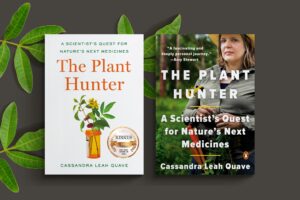
Photo: Cassandraquave.com
In The Plant Hunter A Scientist’s Quest for Nature’s Next Medicines (Viking, $27) Cassandra Quave, Ph.D., associate professor of dermatology and human health, Emory University, shares her life’s journey in pursuit of plants and their curative properties. Quave describes her growing years in Florida, including a childhood peppered with surgeries, her pursuit of an education meant to lead her to medical school and her charge of heart following an internship in the Amazon.
The 371-page hardcover book published in 2021 is divided into three main parts: Nature, Infection and Medicine. In its pages the scientist describes her marriage to an Italian man and the birth of three children, alongside studying for a postgraduate degree, her search for a steady income stream that resulted in grants and took her to Emory University where she also became herbarium curator.
Two attempts to reach Quave by email via her website and the publisher over weeks failed. She responded initially to a more recent message and has yet to reply for an interview request.
According to her biography she leads anti-infective drug discovery research initiatives and teaches courses on medicinal plants, food, and health; is the co-founder of PhytoTek LLC, “a drug-discovery company dedicated to developing solutions from botanicals for the treatment of recalcitrant antibiotic-resistant infections.” Her website lists, among other current and past funding sources, the National Institute of Health, National Eczema Association, United States Agency for International Development and The Coca Cola Company.
Comments:
Filed Under: Books
Posted by Elena del Valle on July 26, 2023
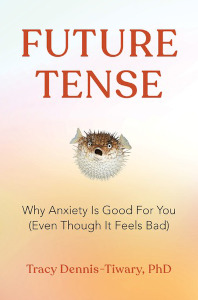
Future Tense
Photos: HarperCollins Publishers, Jenny Anderson
In Future Tense Why Anxiety Is Good For You (Even Though It Feels Bad) (Harper Wave, $29.99) Tracy Dennis-Tiwary, Ph.D. shares her views on the importance of anxiety in our lives. The 237-page hardcover book was published in 2022. She explains in the book that anxiety acts like fear yet contains qualities of hope.
The emotion addresses concerns about an uncertain future, the author says. As a result it causes us to become aware of potential threats and makes us see the discrepancies between where we are in the present and where we want to be in the future. According to Dennis-Tiwary, anxiety arises from the intersection of the brain’s automatic, ancient and reflexive functions and its deliberative and cognitively sophisticated ones. Anxiety, she says in the book, provokes the production of cortisol as well as oxytocin.

Tracy Dennis-Tiwary, Ph.D.
The author says in the book that anxiety evolved to provide what we need, to “guide and motivate us to change situations” for our benefit while at the same time managing its built-in unpleasantness. According to her website bio Dennis-Tiwary is a scientist and entrepreneur as well as a professor of psychology and neuroscience, director of the Emotion Regulation Lab at Hunter College, The City University of New York, and co-founder of Arcade Therapeutics, where she translates “neuroscience research into gamified, clinically validated digital therapeutics for mental health.”
Comments:
Filed Under: Books
Posted by Elena del Valle on July 12, 2023

The Future of Money
Photo: The Belknap Press of Harvard University Press
In The Future of Money How the Digital Revolution Is Transforming Currencies and Finance (The Belknap Press of Harvard University Press, $35) Eswar Prasad outlines the basics of money today and explores what the future might bring. Published in 2021 the 485-page hardcover book is divided into four sections and 10 chapters as well as extensive end notes. There were no replies to email requests for an interview from the publishing company or from Prasad’s email address.
In the book he expresses the belief that Central Bank Digital Currencies (CBDCs) are likely to be a part of our future; and that the use of digital payments in lieu of cash will displace privacy in commercial transactions. He says that despite the loss of privacy they bring financial technologies have the potential to improve the economic conditions for many, especially the poor and economically marginalized.
He describes two main types of CBDCs, wholesale and retail. Wholesale refers to transactions between the central bank and banks and financial payment companies. Retail refers to individuals and businesses. Within retail there are three categories, according to the author: e-money such as the digital money payment services like PayPal and Venmo offer as well as that offered by pioneering central banks like the Riksbank in Sweden; a second option, more technologically sophisticated, is an account based CBDC through which individuals and businesses would have accounts directly at the central banks; and an officially sanctioned cryptocurrency, a form of digital currency designed to operate on “permissioned blockchains.”
Cryptocurrencies instead of bypassing governments and affording users some anonymity may have the opposite effect at the expense of individual liberties, he speculates. In the final chapter he explains that such changes won’t solve all problems; corruption, lax government, the advantages of the elites and inequality will continue to plague society.
According to his book jacket bio at the time the book was published Prasad was the Tolani senior professor of Trade Policy and professor of economics at Cornell University; he was a senior fellow at the Brookings Institution, where he held the New Century Chair in International Economics; and a research associate at the National Bureau of Economic Research. His other titles include Gaining Currency: The Rise of Renminbi and The Dollar Trap: How the U.S. Dollar Tightened its Grip on Global Finance.
Comments:
Filed Under: Books
Posted by Elena del Valle on June 7, 2023
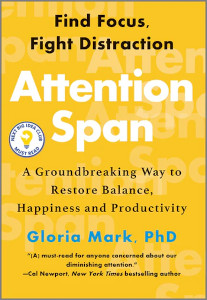
Attention Span
Photo: Hanover Press
Gloria Mark, Ph.D., professor, Informatics at the University of California, Irvine, believes she has found a new concept that identifies how our brains work in the digital world. She calls it kinetic attention and describes why she thinks it may help readers of Attention Span: A Groundbreaking Way to Restore Balance, Happiness and Productivity (Hanover Press, $28.99), her new book, to gain control of their productivity.
The 360-page hardcover book, published earlier this year, is divided into 14 chapters and three main parts: The Anatomy of Attention, The Underlying Forces of Distraction and Focus, Rhythm and Balance. In the book she explains that although we are in the Wild West era of the digital age we should be able to modify and manage the digital world despite the many pressing challenges it poses in our daily lives. Each of us has the power to determine where to focus our attention regardless of the many forces seeking to draw our attention toward them, according to the author.
Mark has been a visiting senior researcher at Microsoft Research since 2012, according to the biography in her book. She did not reply to requests for an interview or to answer questions submitted via email to a representative from her publishing company.
Comments:
Filed Under: Books
Posted by Elena del Valle on May 17, 2023
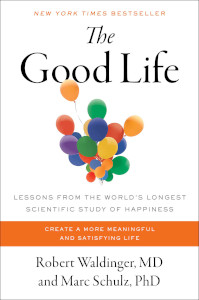
The Good Life
Photos: cover photo courtesy of Simon and Schuster, Robert Waldinger photo by Katherine Taylor, Marc Schulz photo by Ann Chwatsky
Robert Waldinger, Ph.D., director, Harvard Study of Adult Development, and Marc Schulz, Ph.D., associate director of the same study, believe healthy relationships are key to happiness. They explain their reasons in The Good Life Lessons From the World’s Longest Scientific Study of Happiness (Simon and Schuster, $28.99), a 341-page hardcover book published this year.
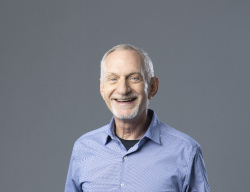
Robert Waldinger, Ph.D., co-author, The Good Life
Along with reading, writing and arithmetic the authors propose that social fitness should be taught to children and included in public policy considerations. It should also be an important part of adult lives; emphasis on relationships, they say in the book, pays off.
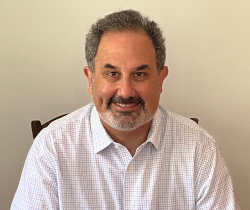
Marc Schulz, Ph.D., co-author, The Good Life
The authors reached their conclusions based on the findings of the Harvard Study of Adult Development, a multi-generational volunteer study conducted by Harvard researchers among students beginning in 1938, and later paired with a study of area non students from disadvantaged backgrounds. In total more than 2,000 people, a high percentage of the initial participants and their descendants, shared personal information, answered questions over their lives, provided blood samples, and in some cases donated their brains after their passing in furtherance of the study goals.
Waldinger and Schulz discuss the study findings in the book while weaving stories around the lives of some of the participants (keeping their identities private) and their relatives. It’s never too late, the authors say, about finding happiness and changing attitudes and behaviors. Life is in many ways, at least for the study participants, about the joys offered by relationships rather than financial successes, it seems. The authors acknowledge that some participants may have altered their views and behaviors as a result of their participation in the study.
Comments:
Filed Under: Books
Posted by Elena del Valle on March 22, 2023
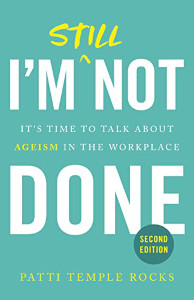
I’m Still Not Done
Photos: Patti Temple Rocks
Patti Temple Rocks, a communicator with four decades of experience, according to her biography, is troubled by corporate ageism. In the second edition of “I’m Still Not Done: It’s Time to Talk About Ageism In The Workplace (Lioncrest Publishing), a 237-page paperback nonfiction title published last year, she discusses her experiences with ageism and her views on combating it.
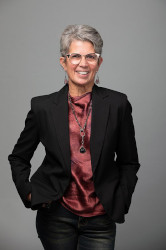
Patti Temple Rocks, author, I’m Still Not Done
“Ageism is the only form of workplace discrimination that all of us are susceptible to,” Temple Rocks said in a book related press release. “The sad truth is that organizations who don’t value their older workers are missing out on the unique wisdom and dedication that these employees bring to the table.”
As of this writing the author is unavailable for an interview according to a publicist who responded by email. She didn’t respond to questions submitted to her publicist.
The book is divided into nine chapters. According to promotional materials Temple Rocks has held senior leadership positions in three sectors of the communications industry: public relations, advertising, and client side; she served as chief communications officer for The Dow Chemical Company, and chief reputation officer for Leo Burnett Worldwide. She is a self-described public speaker and consultant.
Comments:
Filed Under: Books


























